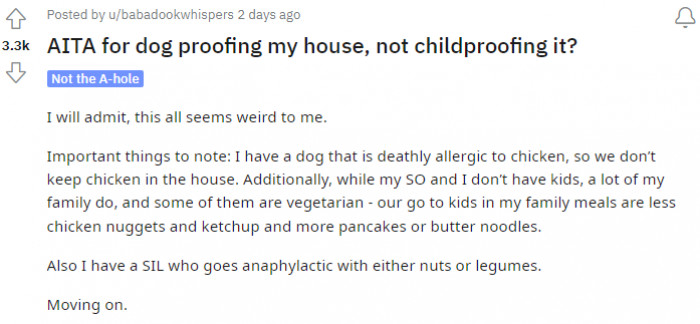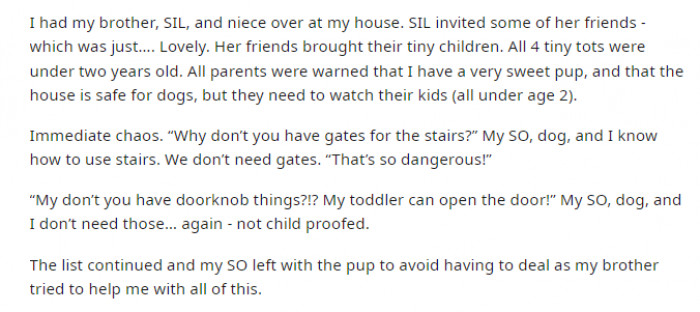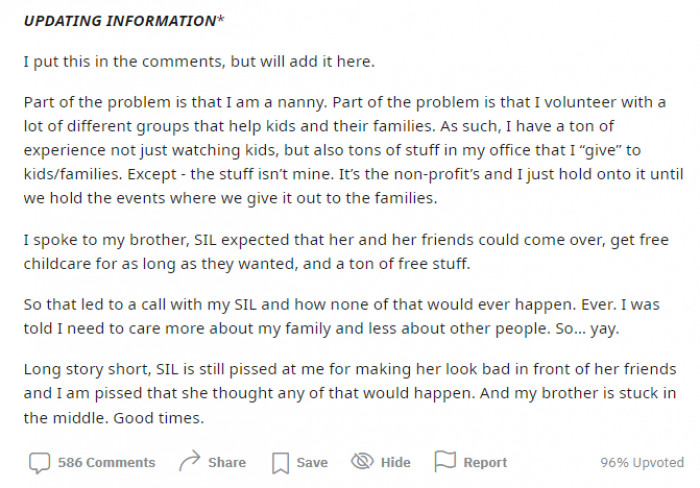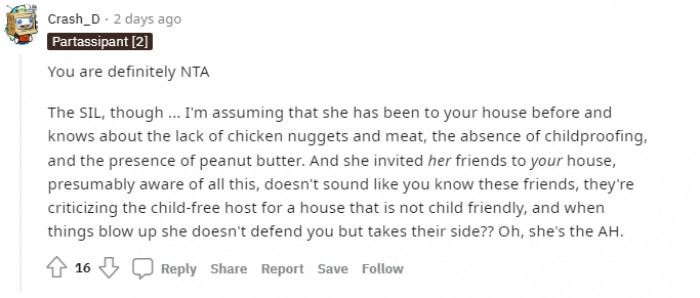Child-Free Woman Asks If She's An A**Hole For Dog Proofing Her House Instead Of Child Proofing It
It's pretty safe to say that we're all animal lovers here, right? So, it's a reasonable assumption that any one of us would do anything within our power to keep our fur kids safe and healthy.
But one Reddit user recently discovered that not everyone understands the level of love and dedication we have for our animals.
The Redditor u/babadookwhispers posted about her recent experience with some family members in the AITA (Am I The A**hole?) subreddit, asking, "AITA for dog proofing my house, not childproofing it?" The Redditor explained that her dog is extremely allergic to chicken, so her family does not keep any chicken in their house.
Sounds like a reasonable and responsible thing to do, right? She also mentioned that although she and her partner don't have children, some of the kids in their extended family are vegetarians.
So, the kids' food choices kept in her home are generally vegetarian options. Again, sounds perfectly reasonable.
However, some of our OP's family members have taken issue with her food choices. She explained that her brother, SIL, and niece recently visited and brought some of their friends and their young children over.
The Redditor explained that she had pre-warned her guests that her home is more dog-friendly than child-friendly, so they would need to keep close tabs on their little ones. But apparently, that wasn't acceptable.
The guests immediately wanted to know why there were no baby gates on the stairs or child locks on the doors. The list went on before one of the moms decided it was time for her daughter to eat lunch.
So, our OP, who understandably wasn't expecting to have to feed everyone and their children, decided to make pancakes. But the lunch-demanding mom said that pancakes are a "breakfast food" and her child needs protein.
She demanded chicken nuggets for her toddler, and when our OP explained that she didn't have any, it didn't go over well. "What do you mean you don't have chicken nuggets?" the mom asked.
Our OP told her about their dog being allergic and that they don't keep chicken in the house at all. The Redditor went into the kitchen and started making pancakes when the mom began rifling through her cupboards, looking for something else.
She came across the dog's medicine, along with a giant tub of peanut butter. She screamed in horror, saying that their SIL can't eat peanuts and how dare they have peanut butter in their house.
The woman went on about how it wasn't right to prioritize a dog over her SIL, and how she could die if she came in contact with the peanut butter. By that point, our OP had enough and asked everyone to please leave.
Later on, she received a text message from her SIL, saying that it was wrong to prioritize the dog and to refuse to feed "hungry kids." Well, as always, the Reddit community had plenty to say on the topic, so keep scrolling to find out their reaction.
The Redditor asked, "AITA for dog proofing my house, not childproofing it?"

She explained that her brother, SIL, and niece recently visited and brought some of their friends and their young children over.
The Redditor explained that she had pre-warned her guests that her home is more dog-friendly than child-friendly, so they would need to keep close tabs on their little ones. But apparently, that wasn't acceptable.

The list went on before one of the moms decided it was time for her daughter to eat lunch.
She demanded chicken nuggets for her toddler, and when our OP explained that she didn't have any, it didn't go over well.

The Psychological Impact of Choosing Between Pets and Children
The decision to dog-proof a home instead of child-proofing it raises significant psychological questions about values and priorities. Research in developmental psychology indicates that individuals often reflect their personal values and experiences in their living environments. A study published in the Journal of Family Psychology emphasizes that choices made in a household can reveal underlying beliefs about family dynamics and responsibilities.
Understanding these choices can foster discussions about the roles pets and children play in family life, addressing any concerns that may arise from differing priorities.
The Psychology of Child-Free Choices
Dr. Kate Simmons, a developmental psychologist, explains that the decision to remain child-free is often influenced by a variety of personal, societal, and psychological factors.
Research shows that individuals who choose to be child-free may prioritize their careers, personal freedom, and lifestyle preferences over traditional family structures.
According to studies published in the Journal of Family Psychology, this choice can lead to unique emotional and social dynamics.
The Psychology of Pet Ownership Choices
The decision to dog-proof a house instead of child-proofing reflects deeper psychological values and priorities in lifestyle choices. Dr. Michael Thompson, a developmental psychologist, explains that pet ownership often represents an emotional commitment that can rival traditional family structures.
Research suggests that individuals without children may develop intense bonds with their pets, leading to unique caregiving dynamics that prioritize animal welfare over child-centric norms.
"What do you mean you don't have chicken nuggets?"

The Redditor went into the kitchen and started making pancakes when the mom began rifling through her cupboards.
She came across the dog's medicine, along with a giant tub of peanut butter. She screamed in horror, saying that their SIL can't eat peanuts and how dare they have peanut butter in their house.

The woman went on about how it wasn't right to prioritize a dog over her SIL, and how she could die if she came in contact with the peanut butter.
Later on, she received a text message from her SIL, saying that it was wrong to prioritize the dog and to refuse to feed "hungry kids."

From a social perspective, the reactions of guests to the lack of child safety measures highlight societal expectations surrounding parenting and pet ownership. Research shows that societal norms often dictate how individuals approach family structures, including expectations for child safety. A study published in the Journal of Social Issues discusses how these norms can create pressure on individuals to conform to specific standards, influencing their decisions about home safety.
Recognizing these societal influences can help individuals navigate conversations about their choices more effectively.
The woman's decision to dog-proof her home instead of child-proofing it reflects a personal choice that may evoke mixed reactions from others.
Behavioral psychologists suggest that societal expectations can create pressure on individuals to conform to traditional family norms.
Understanding these dynamics can foster empathy and reduce judgment from others regarding personal choices.
Studies in social behavior indicate that individuals may feel judged or misunderstood when their lifestyle choices deviate from societal norms. This can create conflict, especially when friends or family have different expectations regarding household arrangements.
Understanding these dynamics can help pet owners navigate social interactions more effectively, fostering a sense of belonging within their communities.
Our OP later posted an update saying that things weren't much better and there was still a lot of tension between family members.

Here's how people reacted.

"This entitlement is shocking."

The Role of Attachment in Family Dynamics
The differing priorities between pet ownership and child-rearing can be viewed through the lens of attachment theory. Research indicates that individuals form attachments based on their experiences and relationships, which can shape their perceptions of family roles. A study in the Journal of Experimental Psychology highlights how attachment styles influence behavior and decisions surrounding family dynamics.
Understanding these attachment styles can help individuals navigate tensions that arise when values differ regarding pets and children.
Cultural Norms and Family Expectations
Cultural expectations regarding family structures can significantly impact individuals' choices about child-rearing and pet ownership.
Research indicates that societal norms can create a sense of obligation to conform to traditional parenting roles.
This pressure can lead to feelings of guilt and inadequacy among those who choose alternative lifestyles.
The Role of Identity in Pet Ownership
Pet ownership can be a significant aspect of personal identity, particularly for individuals without children. Research suggests that pets often fulfill emotional needs and contribute to a sense of purpose and belonging.
Understanding the psychological role of pets in one’s life can help individuals articulate their choices to others, reducing feelings of guilt or defensiveness.
"The real problem here is your SIL."

"NTA!"

"It's weird."

From a psychological perspective, prioritizing pets over children may evoke strong emotional responses from others, particularly those with different values. Research shows that individuals often respond emotionally when they perceive a threat to their values or beliefs. A study published in the Journal of Personality and Social Psychology demonstrates that deeply held values can trigger defensiveness and conflict in interpersonal discussions.
Approaching these conversations with empathy and understanding can help mitigate tensions and foster more productive dialogues.
Encouraging open dialogues about diverse family structures can help reduce stigma and promote acceptance.
Studies suggest that fostering conversations about different life choices can enhance understanding and acceptance within communities.
Creating spaces for these discussions can empower individuals to embrace their choices without fear of judgment.
Communicating the reasons behind pet-proofing decisions can foster understanding among friends and family. Transparency about lifestyle choices can help bridge gaps in perception and foster acceptance.
Studies in communication psychology indicate that open dialogue can significantly enhance relationship quality and reduce misunderstandings.
"These people are ridiculous."

"You urgently need to learn to set boundaries."

"Hard to believe people would behave this way."

Navigating Family Dynamics with Compassion
To navigate the complexities of prioritizing pets over children, individuals might consider employing empathetic communication strategies. Studies show that using 'I' statements can help express feelings without provoking defensiveness. For instance, saying 'I feel that my pets are part of my family and deserve care' can help others understand the emotional weight behind the decision.
Encouraging open dialogue about values and priorities can create a space for understanding and compromise, fostering healthier family dynamics.
The Psychological Impact of Pet Ownership
Pet ownership can provide significant emotional support and companionship, making the decision to prioritize pets over children a valid choice for many. According to Dr. Kelly Brogan, a psychiatrist, "Pets can offer unconditional love and companionship, which can significantly enhance our emotional well-being." Furthermore, Dr. Dan Siegel, a psychiatrist and author, notes that "the bond between humans and animals can lead to increased happiness and reduced feelings of loneliness." Understanding the emotional dimensions of pet ownership can help individuals validate their lifestyle choices.
Navigating Social Expectations
Addressing social expectations around parenting and pet ownership requires a nuanced understanding of individual values. Research suggests that societal pressures can lead to feelings of inadequacy or conflict when one’s lifestyle does not align with traditional norms.
Recognizing these pressures can empower individuals to assert their choices confidently without fear of judgment.
"I'm not sure how your kitchen was confused for a restaurant."

Hidden motives.

"Your house, your life."

Ultimately, navigating the decision to dog-proof rather than child-proof a home involves understanding the psychological implications of those choices. Research indicates that individuals often make decisions based on their values and emotional attachments. A report from the American Psychological Association highlights the importance of recognizing and respecting different family structures and priorities, promoting healthier conversations about pets, children, and family dynamics.
By fostering an environment of empathy and understanding, families can navigate these conversations more effectively, leading to more harmonious relationships.
Recognizing the emotional connections individuals have with their pets can foster greater acceptance of diverse family structures.
Studies indicate that individuals who appreciate the bonds formed with their pets are more likely to advocate for alternative family norms.
Encouraging discussions about these connections can promote understanding and respect for personal choices.
Exploring alternative narratives around pet ownership can help reshape perceptions. Celebrating the emotional and social value of pets can encourage broader acceptance of diverse family structures.
Research in social psychology emphasizes that challenging societal norms can lead to greater inclusivity and understanding.
The entitlement is real.

"They should stay at their own place."

SIL is the a**hole!

Navigating Social Reactions to Lifestyle Choices
Individuals who choose alternative lifestyles often face scrutiny and judgment from society.
Research suggests that this scrutiny can lead to feelings of isolation and inadequacy.
Understanding the psychological impacts of societal judgment can help individuals develop resilience and affirm their choices.
The Importance of Community Support
Building community connections with other pet owners can provide essential support and validation. Engaging in social groups that celebrate pet ownership can help individuals feel understood and accepted in their choices.
Studies indicate that supportive social networks contribute to improved mental well-being and life satisfaction, particularly for those who may feel marginalized.
"I would have made them leave."

"Wow!"

"They couldn't even be bothered to plan for their own kids' needs."

Encouraging supportive networks can empower individuals to embrace their choices without fear of criticism.
Studies show that social support can enhance self-esteem and promote positive mental health.
Creating communities that celebrate diverse lifestyles can help individuals feel accepted and valued.
Ultimately, fostering an open-minded community that respects diverse lifestyles is crucial for mental health and social harmony. These conversations can lead to greater understanding and acceptance of varying family dynamics.
Research highlights the importance of community acceptance in promoting psychological well-being and reducing feelings of isolation.
"You don't invite people to other people's houses."

"There are so many problems with what I just read."

"Smear peanut butter on everything!"

Practical Strategies for Acceptance
To foster acceptance of diverse family structures, it’s essential to promote education and awareness about different lifestyle choices.
Research suggests that community programs focusing on diversity can enhance understanding and reduce stigma.
Creating workshops and discussions that celebrate different family norms can empower individuals to share their stories and experiences.
"Who tf has nuggets just lying around in the freezer?"

What's your take on this Redditor's dilemma? Do you think she was wrong for asking the guests to leave in this situation, or do you think she was well within her rights to do so?
Surely there has to be some sort of etiquette around not inviting random people over to someone's house. Let alone allowing them to make demands and pass judgement on the host.
We would love to hear your opinions on this. You can share your thoughts with us in the comment section below.
Psychological Analysis
This situation illustrates the complexities of navigating societal expectations around family structures. It’s crucial for individuals to feel empowered in their choices and communicate openly with others to foster understanding and acceptance.
Analysis generated by AI
Analysis & Alternative Approaches
Experts emphasize the significance of understanding the psychological dynamics of pet ownership in the context of social norms. Fostering acceptance and support can enhance the well-being of individuals who prioritize their pets as family members.
Analysis & Alternative Approaches
The decision to prioritize pets over children reflects a growing trend in society that challenges traditional norms.
By fostering open conversations and promoting acceptance of diverse lifestyles, individuals can navigate societal pressures more effectively.
Ultimately, understanding the psychological dimensions of these choices can lead to greater empathy and support for all family structures.
Analysis & Alternative Approaches
In conclusion, the decision to prioritize pets over children in household safety reflects deeper psychological values that shape family dynamics. By understanding these implications, individuals can foster more compassionate discussions about their choices, promoting healthier relationships among family members.
Ultimately, this approach encourages empathy and understanding, allowing families to navigate differing priorities in a supportive environment.



